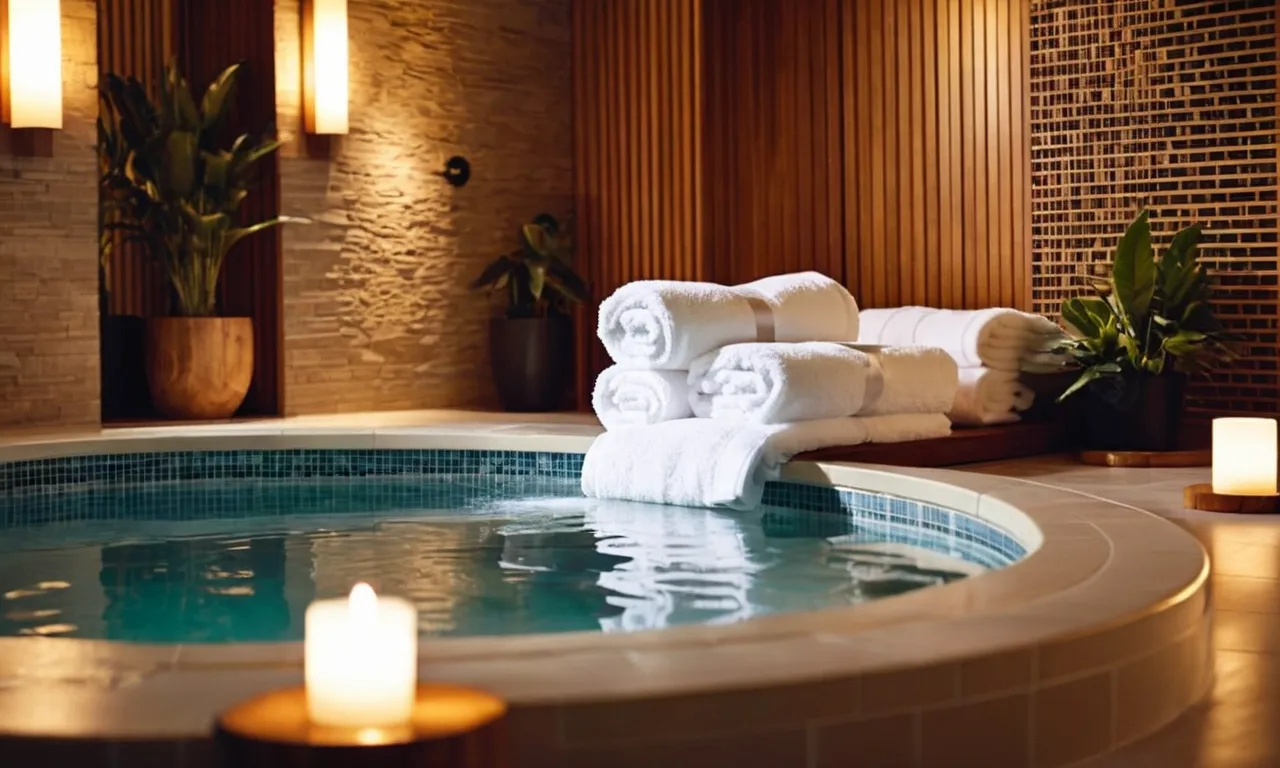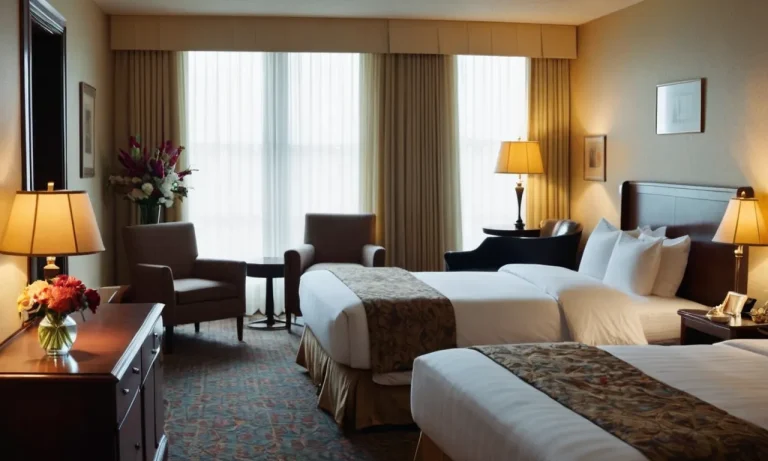What Are Amenities In A Hotel? A Comprehensive Guide
When it comes to choosing the perfect hotel for your next vacation or business trip, one of the most crucial factors to consider is the amenities offered. Amenities are the additional services, facilities, and features that enhance your overall stay, making it more comfortable, convenient, and enjoyable.
If you’re short on time, here’s a quick answer to your question: Hotel amenities are the extra services, facilities, and features provided by a hotel to enhance the guest experience. These can include on-site restaurants, fitness centers, swimming pools, spas, business centers, and various other offerings that cater to the needs and preferences of different types of travelers.
In this comprehensive guide, we’ll dive deep into the world of hotel amenities, exploring their types, importance, and how they can influence your decision-making process when selecting the ideal accommodation for your needs.
Types of Hotel Amenities
When it comes to choosing a hotel, amenities play a crucial role in enhancing the overall guest experience. From the moment you step into your room to the time you bid farewell, a wide array of amenities can make your stay truly memorable.
Let’s explore the various types of hotel amenities that cater to different needs and preferences.
Guest Room Amenities
Guest room amenities are the first things you’ll encounter during your stay, setting the tone for your experience. These amenities can range from basic necessities to luxurious indulgences. Some common guest room amenities include plush bedding, high-quality linens, complimentary toiletries, coffee/tea makers, mini-bars, flat-screen TVs, and high-speed Wi-Fi. Many hotels also offer additional amenities like pillow menus, bathrobes, slippers, and turndown service to enhance your comfort.
Dining and Entertainment Amenities
Dining and entertainment amenities cater to your culinary cravings and leisure desires. Hotels often feature on-site restaurants, bars, and lounges, offering a variety of cuisines and ambiances. Some hotels even boast Michelin-starred restaurants or celebrity chef-owned eateries.
Additionally, amenities like room service, poolside bars, and nightclubs provide convenient dining and entertainment options without leaving the premises. According to a recent survey by Statista, 89% of travelers consider on-site restaurants as an important hotel amenity.
Recreational and Wellness Amenities
Recreational and wellness amenities cater to your desire for relaxation, rejuvenation, and fitness. Many hotels offer on-site fitness centers, swimming pools (indoor or outdoor), spas, and wellness centers.
These amenities allow you to maintain your workout routine or indulge in pampering treatments during your stay. Some hotels even offer unique amenities like tennis courts, golf courses, or beach access, catering to specific interests.
According to a study by Hotel News Resource, 67% of travelers prioritize fitness centers when choosing a hotel, highlighting the importance of recreational amenities.
Business and Meeting Amenities
For business travelers and event organizers, hotels offer a range of amenities to facilitate productive work and successful meetings. These amenities often include business centers, meeting rooms, conference facilities, audio-visual equipment, high-speed internet, and catering services. Some hotels even have dedicated business floors or executive lounges with exclusive amenities like private check-in, complimentary breakfast, and evening cocktail receptions.
According to a Hotel News Resource study, 74% of business travelers consider meeting facilities an important factor when selecting a hotel.
Whether you’re seeking relaxation, entertainment, or productivity, hotels strive to cater to diverse preferences with their comprehensive range of amenities. By understanding the different types of amenities available, you can make an informed decision and choose the hotel that best aligns with your needs and desires, ensuring a truly memorable and enjoyable stay.
😊
The Importance of Hotel Amenities
In the highly competitive hospitality industry, the quality and range of amenities offered by a hotel can make or break a guest’s experience. Amenities are the additional facilities, services, and conveniences provided to enhance the overall stay, and they play a crucial role in shaping a hotel’s reputation and success.
Let’s delve into the significance of hotel amenities and how they contribute to various aspects of the business.
Enhancing Guest Experience
Amenities are the backbone of creating memorable and enjoyable experiences for guests. From luxurious spa facilities and state-of-the-art fitness centers to complimentary Wi-Fi and in-room entertainment options, these offerings cater to the diverse needs and preferences of travelers.
According to a survey by Statista, 83% of hotel guests consider amenities as an essential factor when choosing their accommodation. By providing a comprehensive range of amenities, hotels can exceed guest expectations and foster a sense of satisfaction and loyalty 😊.
Catering to Diverse Needs
The modern traveler is diverse, with varying preferences, cultural backgrounds, and requirements. Amenities allow hotels to cater to these diverse needs, ensuring that every guest feels welcomed and accommodated.
For instance, hotels may offer specialized amenities for families with children, such as kid-friendly pools, game rooms, or babysitting services. Business travelers, on the other hand, may appreciate well-equipped business centers, meeting rooms, and high-speed internet access.
By offering a wide array of amenities, hotels can attract and retain a broader customer base 👏.
Competitive Advantage
In a crowded market, amenities can serve as a powerful differentiator, setting a hotel apart from its competitors. Unique and innovative amenities can create a lasting impression on guests and become a selling point for the property.
For example, a hotel with a rooftop bar or a cutting-edge fitness center can attract guests seeking those specific experiences. According to a study by HospitalityNet, 68% of travelers are willing to pay more for hotels with exceptional amenities.
By continuously updating and enhancing their amenities, hotels can maintain a competitive edge and attract discerning travelers.
Revenue Generation
Amenities not only enhance the guest experience but can also contribute significantly to a hotel’s revenue streams. Many amenities, such as spas, restaurants, and recreational facilities, can be monetized and generate additional revenue for the property.
Furthermore, by offering premium amenities, hotels can justify higher room rates and attract guests willing to pay a premium for luxury experiences. According to HotelNewsResource, hotels with robust amenity offerings can see up to a 25% increase in revenue per available room (RevPAR) compared to properties with limited amenities.
Factors to Consider When Evaluating Hotel Amenities
When it comes to choosing a hotel, the amenities on offer can make or break your stay. After all, who doesn’t love a little pampering and luxury during a vacation or business trip? 😍 However, not all amenities are created equal, and it’s crucial to consider several factors to ensure you make the most of your hotel experience.
Purpose of Stay
The purpose of your stay should be the first consideration when evaluating hotel amenities. Are you traveling for business or leisure? If it’s a business trip, you might prioritize amenities like a well-equipped business center, high-speed Wi-Fi, and meeting rooms.
On the other hand, if you’re on vacation, you might value amenities like a pool, spa, or fitness center more. According to a survey by Statista, 70% of travelers consider free Wi-Fi as the most important hotel amenity.
Budget
Your budget plays a significant role in determining the amenities you can afford. Luxury hotels often offer a wide range of high-end amenities, but they come at a premium price. On the other hand, budget hotels may have fewer amenities but can be more affordable.
It’s essential to strike a balance between your desired amenities and your budget constraints. Consider creating a prioritized list of must-have amenities and those that are nice-to-have but not essential.
Location
The location of your hotel can also influence the amenities you might need or want. If you’re staying in a city center, you might not require a pool or spa since you’ll likely be exploring the local attractions.
However, if you’re staying in a resort area, a pool and other recreational amenities might be more important. Additionally, consider the proximity of the hotel to local restaurants, shops, and transportation hubs, as these can impact your need for on-site amenities.
Personal Preferences
At the end of the day, your personal preferences should guide your decision-making process when it comes to hotel amenities. Some travelers might prioritize a well-equipped fitness center, while others might value a cozy reading nook or a relaxing spa.
Don’t be afraid to ask the hotel about their amenities and read reviews from previous guests to get a better understanding of what to expect. Remember, the goal is to find a hotel that caters to your specific needs and preferences, ensuring a truly memorable and enjoyable stay.
By considering these factors, you’ll be better equipped to evaluate hotel amenities and make an informed decision that aligns with your purpose, budget, location, and personal preferences. After all, the right amenities can turn a good hotel stay into an amazing one!
Trends and Innovations in Hotel Amenities
Technology Integration
The hotel industry is embracing technology like never before, offering guests a seamless and convenient experience. From mobile check-in and keyless entry to in-room virtual assistants and smart room controls, hotels are leveraging cutting-edge technologies to enhance guest satisfaction.
According to a study by HospitalityNet, 83% of travelers prefer hotels that offer mobile check-in and keyless entry. Additionally, hotels are integrating Internet of Things (IoT) devices, allowing guests to control room temperature, lighting, and entertainment systems with voice commands or a simple app.
Sustainability and Eco-Friendly Initiatives
With an increasing focus on environmental responsibility, hotels are adopting sustainable and eco-friendly practices. From energy-efficient lighting and water conservation measures to recycling programs and locally sourced organic food options, hotels are making conscious efforts to reduce their carbon footprint.
According to Green Hotelier, a leading organization promoting sustainable practices in the hospitality industry, eco-friendly amenities can lead to a 20-30% reduction in operational costs. Additionally, a TripAdvisor survey revealed that 66% of travelers are more likely to choose an eco-friendly hotel, highlighting the growing demand for sustainable accommodations.
Personalized Experiences
Hotels are recognizing the importance of tailoring experiences to individual preferences. From customized in-room amenities and personalized concierge services to curated local experiences and bespoke wellness programs, hotels are going the extra mile to create unforgettable and personalized stays.
According to a study by McKinsey, 71% of consumers expect companies to deliver personalized interactions and experiences. Furthermore, hotels are leveraging data analytics and artificial intelligence to gain insights into guest preferences, enabling them to deliver highly personalized services and recommendations.
👏 Personalization not only enhances guest satisfaction but also fosters loyalty and repeat business.
Unique and Niche Offerings
In a crowded market, hotels are differentiating themselves by offering unique and niche amenities that cater to specific interests or preferences. From pet-friendly accommodations and wellness retreats to culinary experiences and adventure packages, hotels are catering to diverse guest needs.
For instance, Fairmont Hotels & Resorts offers a range of unique amenities, including a “Bee Sustainable” program where guests can explore on-site apiaries and learn about the importance of honeybees.
😍 These niche offerings not only attract a specific clientele but also create memorable experiences that set hotels apart from their competitors.
As the hospitality industry continues to evolve, hotels are embracing innovative amenities to meet the ever-changing demands of modern travelers. By staying ahead of the curve and offering cutting-edge, sustainable, personalized, and unique experiences, hotels can enhance guest satisfaction, foster loyalty, and thrive in an increasingly competitive market.
🎉
Conclusion
Hotel amenities play a crucial role in shaping the overall guest experience and can significantly influence a traveler’s decision when choosing accommodation. From luxurious spas and state-of-the-art fitness centers to cozy in-room amenities and cutting-edge business facilities, the range of offerings is vast and caters to diverse needs and preferences.
As the hospitality industry continues to evolve, hotels are constantly innovating and adapting to meet the ever-changing demands of guests. By staying informed about the latest trends and innovations in hotel amenities, travelers can make informed decisions and find the perfect accommodation that aligns with their specific requirements, ensuring a truly memorable and enjoyable stay.








